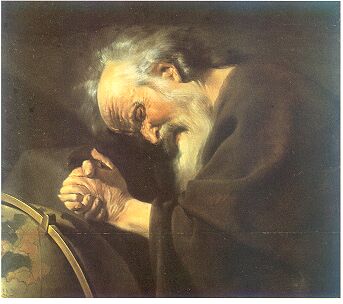Also known as:
Iraklitos, Ηράκλειτος
More People of Greece
More Topic Categories
Heraclitus (~-544 - ~-484)
 Heraclitus was an Ancient Greek philosopher.
Heraclitus was an Ancient Greek philosopher.He was born in Ephesus around 544 BC, while his death has been calculated to have occurred around 484 BC. His father was Blysson and belonged to the clan of Androklides, i.e. those who under the command of Androklos, son of the Athenian King Kodros, decided to leave Athens and settle in Ionia (Asia Minor), founding Ephesus. Very little information is known about his life. Since he was a young boy, Heraclitus managed to inspire and was the epicenter of admiration. Never having studied under the wings of any teacher of the era, he claimed that he had learned everything on his own. Based on the surviving excerpts of his work, it seems that Heraclitus had studied almost all works made by earlier philosophers, epic and elegiac poets, as well as every historical text that was available in Ionia at his time.
He lived in an era characterized by transition, bringing multiple societal, political and economic changes. His philosophy revolved around these events, criticizing them and differentiates his thoughts both from mythological tradition and the newly born society.
Heraclitus was probably the author of a work entitled About Nature, which consists of three parts and discusses political, theological and cosmogonic topics. Based on the very few excerpts of this work that have survived to our days, it seems that it is written in a sententious way. The structure and composition of his aphorisms is carefully processed and he has attained an enigmatic approach. For these very reasons, Heraclitus received the nickname “The Obscure”. In this way, Heraclitus declared that on one hand, he did not want to reveal his thoughts in a direct way; on the other hand, he did not have any intention to deceive his listeners either. He simply provides signs, which the listeners have to decipher on their own and correctly. According to him, his philosophical teachings are not arbitrary and subjective, but rather an expression of the Speech that applies to everything, even if it remains inaccessible to many. Therefore, the difficulty in understanding his teachings is not due to his peculiarities, but in the incapability of the people to understand his own words, but the Speech itself.
For Heraclitus, the concept of Speech has various meanings and definitions. It means “to speak” (spoken language), but it also means the regulatory authority that governs reality and links everything together in ratios. So, speech is the catholic relationship that regulates reality, as it is expressed orally. Hercalitus’ concern is to awaken people and lead them to confession, the rational thought that defines and links the essence of objects. In this way, he distinguishes between “knowing all” and knowing the essence of things.
The universe, according to Heraclitus, is not a result of creation or genesis, but has always existed, and is described as a living fire that may fluctuate in strength but may never be quenched. He also believed that the essence of the cosmos is energy (fire). This was actually proven over two millennia later when Albert Einstein proved that matter and energy are the same.
See Also:
 Athens Photos
Athens Photos
 Santorini Photos
Santorini Photos
 Crete Photos
Crete Photos
 Meteora Photos
Meteora Photos
 Corfu Photos
Corfu Photos

